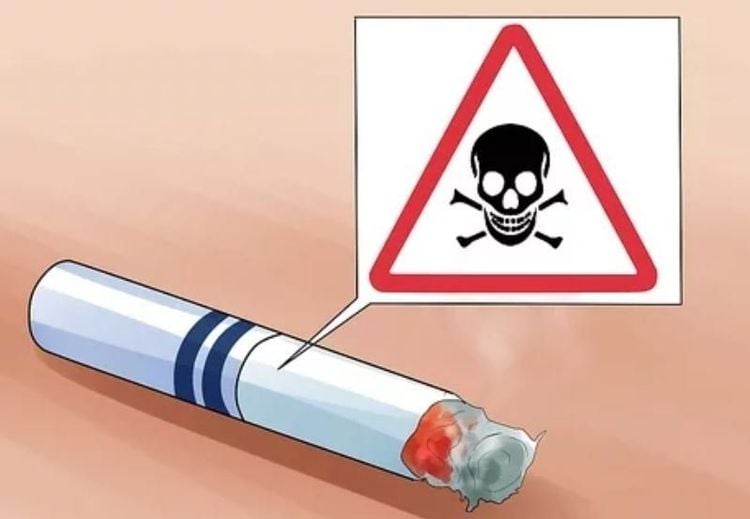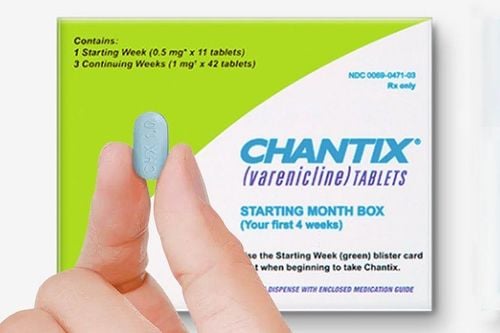This is an automatically translated article.
Smoking is a major contributor to chronic diseases such as heart disease, diabetes, stroke, emphysema and cancer. Therefore, giving up smoking early is an important key to helping you prevent and eliminate the risk of damaging health. Here are 4 “golden” tips to help you quit smoking successfully.
1.Benefits of Quitting Smoking
No matter how much you smoke or how long you smoke, quitting will give you many health benefits. Not only will this help you reduce your risk of various cancers, including lung cancer, but it will also help reduce your risk of heart disease, emphysema, stroke, and other serious illnesses.
Quitting smoking also reduces the risk of heart disease and lung cancer in people who have never smoked as well as those who will be exposed to secondhand smoke.
Quitting smoking at any age reaps tremendous health benefits, but it's important to quit as soon as possible so your body can begin to heal the damage it caused. due to smoking. For example, just 12 hours after you quit smoking, your blood carbon monoxide level will drop to normal. This substance is considered harmful to the body because it displaces oxygen in the blood, resulting in insufficient oxygen supply to the heart, brain and other vital organs.
2.Some “golden” advice for people who want to quit smoking
2.1.Know what makes you want to quit smoking For some people, the reason why they quit smoking can be due to their own health factors. Others want to quit for financial or lifestyle reasons, such as wanting to improve their taste in food or spending more money on important expenses other than cigarettes. According to the Centers for Disease Control and Prevention's advice, you should ask yourself some questions before you want to quit, as this will create a strong motivation to help you get ready to quit. medicine.
You can ask yourself the following questions:
Did I miss something when I smoked? What I don't like about smoking How does smoking affect my health? What will happen to me and my family if I continue to smoke? Will my life get better when I quit?

Muốn bỏ được thuốc lá, người hút cần tìm được lý do thuyết phục
When you know your motivations to give up smoking, remind them to yourself every day. It can become a source of motivation to help you become stronger and more assertive to stop smoking.
Some other health reasons that may help you to consider giving up smoking include:
Your risk of cancer, heart attack, heart disease, stroke, cataracts and other diseases will be increased. reduced. You'll be less likely to catch a cold or flu than before, and your body's recovery will be faster if you're sick. Helps improve airways and less coughing. Helps reduce blood pressure levels. Skin looks healthier and more youthful. Teeth and nails are not yellowed by smoking Reasons to quit smoking can also stem from your desire for a better life, including:
You will save more money to spend on other things. others. You can spend more time with your family, embark on your job or hobby after quitting. You won't have to worry about when and where to smoke. Helps improve taste when eating. Keep the family living environment free of the smell of smoke. You will become a good role model for your children, so it will take a lot of work to be able to quit smoking successfully. Your child will be healthier when you quit smoking. Protect your friends and family from the dangers of secondhand smoke. Boost your health, make you ready to enjoy special moments with your family. According to statistics, each year in the United States, about 480,000 people die from health problems caused by smoking. Therefore, if you are health-conscious, you should make the determination to quit smoking now to reduce the risk of disease as well as mortality.
2.2.Be kind to yourself Quitting smoking can be very difficult for you, especially since most tobacco products contain a highly addictive chemical called nicotine. People who smoke because of their addiction to nicotine are used to having this substance in their bodies. Because of this, when you're trying to quit, you may experience withdrawal symptoms, including trouble sleeping, anxiety, and cravings. These symptoms make it harder for you to quit, but they should fade over time as your body adjusts to no longer nicotine.
When you try to quit smoking, you should try a few times before successfully quitting. Just keep in mind that you can, and don't be too hard on yourself. Some studies show that previous attempts to quit can be more motivating in the future, and that quitting can take a long time to achieve.

Trong quá trình cai thuốc, người hút có thế gặp tình trạng mất ngủ
2.3.Learn about FDA-approved smoking cessation products Several FDA-approved smoking cessation products can help you quit successfully. Many studies have shown that the use of FDA-approved smoking cessation products can double the success rate of quitting in regular smokers.
Some products contain nicotine as an active ingredient, while others may not. These products often include over-the-counter (OTC) options like skin patches, gum, lozenges, and prescription medications.
Alternatively, you can also use nicotine replacement therapy (NRT) to help you quit smoking. This therapy usually provides a controlled dose of nicotine, which helps you quit smoking by alleviating withdrawal symptoms and cravings. The FDA has approved 2 types of prescription NRT products (including nicotine inhalers and nicotine nasal sprays), and 3 types of over-the-counter nicotine products (including lozenges, transdermal patches, and chewing gums). ). Most of these products have been approved for at least 20 years. While their effectiveness may not be the same for each, these products can help double your chances of successfully quitting.
FDA has approved 2 nicotine-free smoking cessation products, namely Zyban (buproprion hydrochloride) and Chantix (varenicline tartrate), available in tablet form and by prescription only. As for Chantix, this product will work at sites in the brain that are affected by nicotine by reducing the effects of nicotine. However, for Zyban, their effectiveness for smoking cessation has yet to be determined. Like other prescription products, the FDA considers these drugs to offer more benefits than risks. A number of possible risks associated with the use of smoking cessation products include depressed mood, behavioral changes, hostility, aggression, and the formation of suicidal thoughts or actions.
The most common side effects of using Chantix, include constipation, nausea, vomiting, gas, trouble sleeping or experiencing vivid dreams. In addition, they can also change the way your body responds to alcohol, so you should talk to your doctor about your drinking habits (if any) and whether you need to change them. familiar with this. Chantix is also not recommended for use by people under the age of 18.
For Zyban, can cause side effects such as insomnia and dry mouth. On the other hand, this medication contains the same active ingredients as the antidepressant Wellbutrin (bupropion), so you should consider the health risks when choosing to quit with this product. Zynban has also not been studied in people under 18 years of age, and is not approved for use in children or adolescents.
If you are under 18 years of age and want to quit smoking, you should talk to your healthcare professional about the use of smoking cessation products. In addition, before using or being prescribed by a doctor for smoking cessation products, you should carefully read the label and follow the instructions on the prescription.
2.4.Take advantage of other free smoking cessation resources Several campaign ads highlighting the health benefits of quitting smoking appear in many cities across the country. You can look for signs and materials at retail locations, such as convenience stores, to remind yourself that you can quit and to encourage you to try again after several times. unsuccessful smoking cessation.
If you can't find quit campaign ads, you can sign up for free resources to help you make your quit smoking efforts through the website EveryTryCounts.gov – a combination of the FDA and National Cancer Institute (NCI). NCI helps provide text message programs that can provide advice and encouragement to help you quit smoking. Additionally, the site also supports a mobile app that helps you track your smoking triggers, so you can learn to avoid them.
Besides, NCI also provides a team of professional detox coaches to consult and chat with you for free online. It also helps you stay informed about more FDA-approved detox drugs.

Hút thuốc lá gây ảnh hưởng nghiêm trọng đến sức khỏe của người hút
3.Some important tips for using nicotine replacement therapy (NRT)
Pregnant or nursing women should consult a health professional before using nicotine replacement therapy, and only use them with the permission of a doctor.
In addition, the following conditions should also be discussed with a doctor before using NRT therapy, including:
People with heart disease, asthma, diabetes or stomach ulcers People who have had a recent heart attack People with high blood pressure but not controlled with medication People with a history of heart rhythm disorders Prescribed medication to help quit smoking If you are taking prescription medication to treat asthma or depression, you should Talk to your doctor if you are quitting smoking as you may need to change the dose of your prescription.
Also, stop using nicotine replacement products right away and tell your doctor if you have any of the following symptoms:
Dizziness Nausea Weakness Fast or irregular heartbeat Vomiting Problems mouth problems when using lozenges or gum Redness or swelling in the skin around the transdermal patch Hope this information has given you more options to quit smoking . Wish you always have a scientific diet and improve your work productivity and improve your life.
Please dial HOTLINE for more information or register for an appointment HERE. Download MyVinmec app to make appointments faster and to manage your bookings easily.
Reference source: fda.gov












